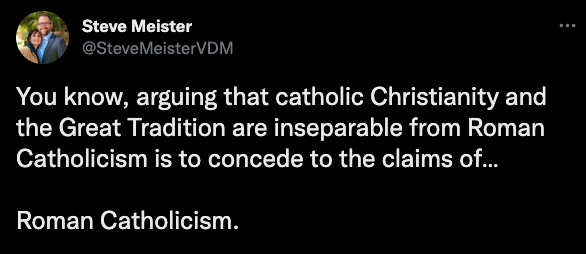Evidently our Great Tradition Baptist thought leaders have decided to stay far, far away from actually telling us how we can define the GT in light of the Second Nicene Council, as per Monday’s Dividing Line. Fully understandable! The reality is, these men have no *consistent* way of disambiguating the traditions in theology proper they wish to demand of us in our modern context from the rest of the theology that actually produced medieval practice and belief. So, on the one hand, they wish to tell us you cannot have a full, balanced, robust, and *confessional* theology of God without all the attendant metaphysical requirements Thomas brought to the faith via Aristotle (or, for others, oddly, the necessary Platonic concepts that supposedly rescue us from modern nihilism), while on the other becoming truly Baptist, and “biblicist,” by examining traditions regarding anthropology, soteriology, ecclesiology, sacramentology, etc., and finding them wanting!

So this morning Pastor Meister throws out another red herring. You would think after months of my asking (and they all listen to the DL, you can tell by watching their tweets over the next 24 hours), that the GT men would have developed a clear answer for how to identify the GT in the first place. But, so far…silence. So we get nebulous and undefined phrases like “catholic Christianity” as if that is a self-evidently defined phrase. Next, they absolutely insist upon ignoring the careful arguments that have been made. I know Roman Catholicism far better than Pastor Meister does, and hence, when I discuss it, I not only use original sources, but I can address issues such as how Rome viewed itself at the Reformation, at Vatican I, or in the modern period. I have plainly differentiated the Romanism of Thomas’ day from that of, say, Vatican I. And I would not say that the highly political, and yes, highly Roman-centered concepts present in Nicea II is even, as yet, a fully-developed Romanism. Surely Rome’s claims are beginning to approach medieval level at that point on the papacy, but there is much that has yet to come to a full enough development to be called “Roman Catholicism.” (I personally identify the 4th Lateran Council—1215—as a very useful date for the actual beginning of what can be defined as full-on Romanism). In any case, the GT men want to pretend that those of us who reject their compromise on sola scriptura (and that is what adopting the GT as an interpretive lens is—likewise demanding that we become Christian Platonists so as to be able to define and defend the Trinity) are doing so on a bland and surface level genetic fallacy, that we can safely disregard and ignore everything from, say, Augustine to Luther as “simply Romanism.” I surely have never even suggested such a stance, but you would never know it from reading their words.
As someone else pointed out, Meister’s tweet is a misdirection. That isn’t the argument. The argument has to do with the *role* of whatever tradition you decide to define in hermeneutics, hence, its relationship to the authority of Scripture. And the fact is, whether they wish to acknowledge it or not, the GT men are stuck in a position where they simply cannot consistently defend the concept of sola scriptura, given they are arguing for a level of authority in the GT that then provides them with a foundational *interpretational* conclusion. They can straw-man the term biblicism all day long, the reality is, to be a Protestant is to hold to a form of biblicism, that is, a fundamental supremacy of Scripture over against anything that is not theopneustos. Once you say there is a God-given “extra” out there, you have to account for its origin or development, and at that point, you join Sadoleto, not Calvin. The GT men need to stop pointing out that the Reformers did not simply start from scratch. No one is arguing they did. No one is arguing they rejected everything that came before them. They didn’t. But what they did do was recognize that for the Christian faith to actually be communicated from generation to generation, there must be a unique capacity of Scripture to carry that defining body of truth to every people, tongue, and every generation. To hold to that is to reject the definitional function of an external tradition, no matter how venerable it might be.


